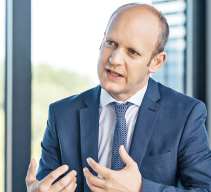
Alex Glanzmann
Head of Finance, Member of Executive Management
Are you satisfied with the result?
Given the difficult market environment, I am satisfied. Achieving this good result called for strong operational performance across all units.
Has it become more difficult to operate profitably?
Without question. The structural change has its effect on our core businesses, and volumes in the communication market and margins in logistics are under pressure. In addition, PostFinance is not allowed to issue loans, interest income is volatile and it is difficult to invest customer capital profitably.
Profits remain solid, but Swiss Post still has to change?
Without stable profits, we can no longer finance the universal service from our own resources in the long term. Swiss Post must transform itself. We must focus clearly and closely on changing customer requirements and develop sensible growth areas in line with our core competencies. At the same time, we must also continue to pursue consistent cost management to free up funds for this development and restructuring.
Group result
Swiss Post delivers a solid result
Swiss Post is continuing to face pressure in its core business due to the accelerating pace of structural change. Operating profit (EBIT) decreased accordingly by 119 million to 704 million francs year-on-year. Operating income is solid at 8,188 million francs. In a highly competitive market, Group profit fell from 645 million francs to 558 million francs. Swiss Post is tackling the change with transformations at all levels: it is investing with foresight in its range of services for private and business customers and is modernizing its infrastructure.
Operating profit (EBIT) decreased from 823 million to 704 million francs. Operating income fell by 36 million francs to 8,188 million francs (previous year: 8,224 million). For 2016, Group profit stood at 558 million francs, which represents a decrease of 87 million francs.
Declining consignment volumes, pressure on margins in the logistics business and the low interest environment in the financial sector are having a growing effect on Swiss Post’s result. Operating profit is also affected by the sale of a PostFinance participation and depreciation of tenant fit-outs in logistics centers, which were necessitated by the rapidly changing economic environment in the logistics business.
Investments for customers
In the past year, Swiss Post made investments of around 450 million francs in developing its infrastructure, in new services and in other themes.
Top marks for quality
In 2016, Swiss Post once more funded the costs of the universal service in full – as well as all investments. Overall, Swiss Post again achieved very high marks for the quality of the universal service, with an accessibility figure of 95.8 percent. Postal legislation stipulates that 90 percent of the permanent residential population must be able to access a post office or postal agency on foot or by public transport within 20 minutes. Once again, this indicates that, in terms of its universal service, Swiss Post ranks among the best in Europe.
Dividend for the Confederation
As at 31 December 2016, Group equity stood at 4,881 million francs (before appropriation of profit). At the General Meeting, the Board of Directors will propose paying a dividend of 200 million francs to the Confederation.
Profound transformation required
The pressure on the core postal business is growing strongly. Against this background, Swiss Post will have to transform itself profoundly over the coming years. It will increasingly adapt its services to customer habits and expand the number of access points available. Swiss Post must therefore continue to restructure its postal network and focus on customer requirements and long-term financial viability, with an emphasis on the successful model of branches with partners. The increase in efficiency throughout all areas of the company is already a key factor in the good operating result and will continue. Finally, Swiss Post is faced with the challenge of creating new sources of income, with all units working intensively on innovation projects designed to stabilize the Group’s operating income in the long term.